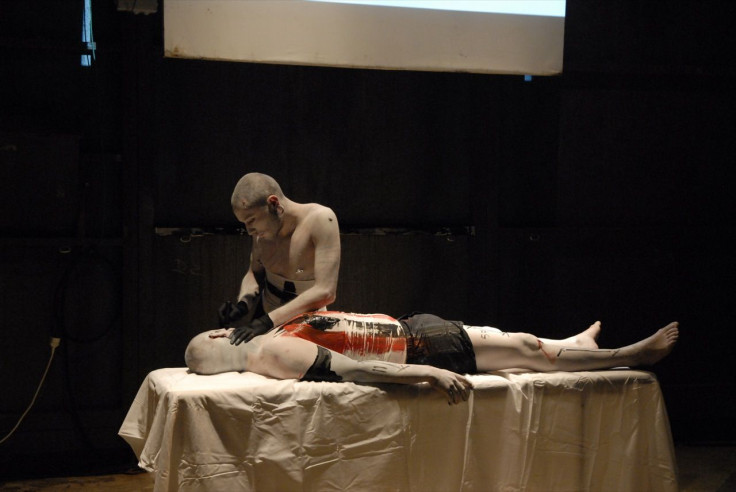Body Hacking: Do Implantable Medical Devices Make Humans Susceptible To Cyber-Attacks?

Although some see invasive technology as a rough spot in the evolution of medicine, scientific prognosticators worry about the expanding array of implantable devices--nano and bio--entering the human body.
In the era of Jules Verne’s fantastical stories about submarines and trips to the moon, J. A. McWilliam first reported experiments in 1899 on the application of electrical pulses to the human heart, finding that an external stimulus could evoke steady, clocklike contractions of the pulmonary muscle. A few generations later, in the era of Ray Bradbury’s dystopian vision of an authoritative future, the artificial pacemaker entered the body, an automated machine controlling the heartbeat. Arne Larsson received the world’s first implantable pacemaker in 1958 in Solna, Sweden, a device connected to electrodes delivering the steady pulse.
Now, contemporary medical science in the early 21st century resembles a creation of the late Gene Roddenberry, creator of Star Trek, as once natural body functions are relegated to technology. As high-tech implantable devices become medical reality, some analysts worry that the future will resemble the plot to the 1966 science fiction classic, Fantastic Voyage, in which a global war is waged by miniaturized explorers entering the human body. Except wireless technology subsumes the need for science fiction; external hackers armed with computers could take control of these devices, compromising not only a person’s medical privacy but their bodily integrity, too.
Sadie Creese, director of the Global Centre for Cyber Security Capacity at the Oxford Martin School at the University of Oxford, says people may become vulnerable to nefarious forces such as hackers or a computer virus.
“I think the future of chronic disease control will be implanted devices,” she told attendees at FutureFest, a conference held in London this month. “They will be measuring vital signs, reaching back to the health care providers, whoever that might be and wherever they’re based. So you can imagine consultants and doctors around the world, or your local doctor, firing up a single app and being able to receive alerts on a patient.”
This month, former Vice President Dick Cheney told 60 Minutes he feared for his life after receiving a pacemaker implant in 2007, directing his doctors to disable its wireless capability to prevent a possible cyber assassination attempt. “I was aware of the danger, if you will, that existed,” he said.
In response, the U.S. Food and Drug Administration reiterated its stance on the safety of medical devices, implanted in 3 million Americans. The government “is not aware of any patient injuries or deaths associated with these incidents,” officials said.
At the meeting in London, social psychologist Bertolt Meyer demonstrated the potential for what may someday become known as a body hack, allowing a fellow speaker to control his bionic hand using an iPhone app connected by bluetooth. “My hand comes with an iPhone app,” he said, as reported by The Conversation. “There is an app for that. This gives the word hacking an entirely new dimension because if someone hacked my phone they could hack my hand.”
Although bionic hands and other body parts remain exceedingly rare, hackers might conceivably attack present systems delivering insulin to diabetics, Myers said. An overdose of insulin could easily put a person in shock, and could potentially kill. Like a drone pilot in Nevada dropping bombs on a target in Afghanistan, someone might exercise the power to take life remotely, by hijacking a medical system intended to save life.
Mostly hypothetical for now, the number and scale of artificial devices creeping into the human body is advancing, Creese said. “The truth of the matter is, it’s kind of already here but mainly for significant conditions,” she said. “Give it five to ten years and we’ll all be wandering around with devices.”
Creese said members of the public should begin to discuss the implications of advancing medical technology, before it’s too late.
“When we think about cyborg futures, be that healthcare or play, we need to get on top of how we make this citizen centric and how we achieve a fair relationship between people and commerce. In understanding that relationship we’ll understand cyber-security,” she said.
However, Creese doubts the average man or woman will express much concern until later in the technological evolution, some years ahead. “I think that the real change and the real concern will come from the general population when more people start to feel pain,” she said. “Whether that’s the lights going out or no one being able to go to hospital one day or whether that’s not being able to get on the Internet for the whole weekend. People have different pain thresholds but in general I think when more people start to feel pain from cyber-attacks there will be a change in the public consciousness.”
By then, cyber-security won’t be just a matter for world governments or international corporations but something felt on a much more personal level, Creese said.



























